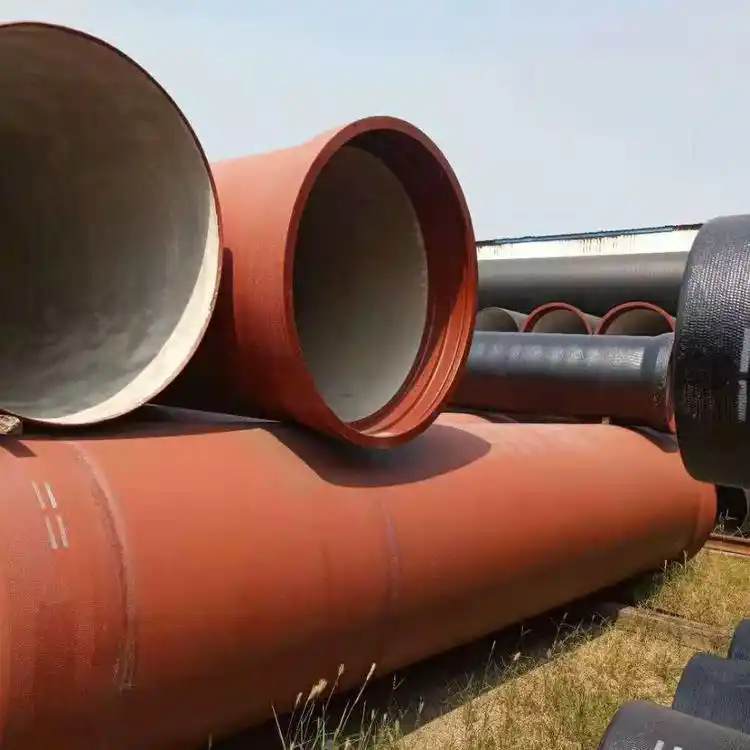The Material Characteristics and Selection Guide of Cast Iron Pipes
2025-01-15 15:07:33 hits:0
In modern infrastructure construction, cast iron pipes play an irreplaceable role in fields such as water supply and drainage, and gas transportation, with their unique performance advantages. A correct understanding of the materials of cast iron pipes and mastering scientific selection methods are crucial for ensuring project quality and extending the service life of pipelines.
I. Material Analysis of Cast Iron Pipes
Cast iron pipes are mainly composed of elements such as iron, carbon, and silicon. According to different production processes and composition ratios, they can be divided into gray cast iron pipes (also known as grey cast iron pipes), ductile cast iron pipes (cast ductile iron pipe), and malleable cast iron pipes.
(I) Gray Cast Iron Pipes
Gray cast iron pipes were a commonly used type of cast iron pipe in the early days. In their metallographic structure, carbon mainly exists in the form of flake - like graphite. This structure gives gray cast iron pipes a certain compressive strength, generally ranging from 100 - 200MPa. However, due to the presence of flake - like graphite, it is equivalent to forming many tiny cracks inside the cast iron, resulting in poor toughness and impact resistance. They are not very suitable for environments with large vibrations or high requirements for pipeline flexibility. For example, in the early urban water supply systems, in some areas where gray cast iron pipes were used, the probability of pipeline rupture was relatively high when experiencing earthquakes or ground subsidence. Comparing gray cast iron pipe with ductile iron pipe, the latter shows more excellent performance in terms of toughness and durability.
(II) Ductile Cast Iron Pipes
Ductile cast iron pipes are currently the most widely used type of cast iron pipe. By adding a spheroidizing agent to the molten iron, carbon exists in the cast iron in the form of spherical graphite. This special structure endows ductile cast iron pipes with excellent performance. Their tensile strength can reach 400 - 800MPa, and the elongation rate is about 10% - 20%, with good toughness and impact resistance. Taking a large - scale water supply project in a certain city as an example, this project laid a 50 - kilometer - long ductile cast iron pipe. In the 10 years after it was put into use, there were only 2 cases of local pipeline damage caused by external construction accidents, and it has been operating stably for the rest of the time, fully demonstrating the high reliability of ductile cast iron pipes. In the ductile cast pipe market, due to their outstanding performance, they are increasingly favored. In addition, ductile cast iron pipes also have strong corrosion resistance. Their surfaces can be further enhanced in corrosion resistance by spraying zinc layers, asphalt paint, etc., and their service life can reach more than 50 years, maintaining good working conditions in various soil environments. When comparing ductile vs cast iron pipe, the ductile cast iron pipe is more corrosion - resistant and has better mechanical properties.
(III) Malleable Cast Iron Pipes
Malleable cast iron pipes are made by graphitizing and annealing white cast iron, and carbon exists in the form of nodular - flocculent graphite. Malleable cast iron pipes have relatively high strength and toughness. Their tensile strength is generally between 300 - 700MPa, and the elongation rate can reach 2% - 15%. However, due to the relatively complex production process and high cost, they are usually used in some special occasions with high requirements for pipeline performance, small pipe diameters, and limited installation space, such as gas pipeline branches inside buildings. Malleable cast iron pipe fittings also need to meet high - precision requirements to ensure the normal operation of the pipeline system.
II. Selection Points of Cast Iron Pipes
(I) Clarify the Usage Scenario and Requirements
Before purchasing cast iron pipes, it is necessary to clarify their usage scenarios. For example, if it is used for the main urban water supply pipeline, it is necessary to consider the requirements of large flow, high pressure, and long - term stable operation. At this time, ductile cast iron pipes are an ideal choice. If it is used for the drainage branch pipes inside buildings, the requirement for the pipe diameter is relatively small, and a suitable gray cast iron pipe or ductile cast iron pipe can be selected according to the budget and installation conditions. If it is used to transport highly corrosive media in chemical enterprises, then the corrosion resistance of cast iron pipes needs to be focused on, and a ductile cast iron pipe with special anti - corrosion treatment may be required.
(II) Pay Attention to Material Quality and Performance Indicators
- Strength Indicators: According to the project design requirements, ensure that the tensile strength, compressive strength, etc. of the selected cast iron pipes meet the pressure requirements in actual use. For example, in gas transmission pipelines with high pressure, the tensile strength of ductile cast iron pipes should not be lower than 400MPa.
- Corrosion Resistance: Understand factors such as the acidity and alkalinity of the pipeline use environment, and select cast iron pipes with corresponding anti - corrosion performance. In coastal areas, where the soil and air contain more salt, cast iron pipes are prone to corrosion. A ductile cast iron pipe with good anti - corrosion performance should be selected, and ensure that its zinc layer thickness is not less than 80μm, and the thickness of the asphalt paint coating meets relevant standards.
- Dimensional Accuracy: The dimensional accuracy of the pipe diameter and wall thickness of cast iron pipes directly affects the installation quality and connection tightness. For example, the deviation of the pipe diameter should be controlled within ±0.5%, and the deviation of the wall thickness should be within ±10% to ensure a tight connection between the pipelines and avoid problems such as water leakage and gas leakage. In addition, the quality of cast iron pipe fittings also affects the overall performance of the pipeline system. High - quality fittings can ensure seamless connection and stable operation.
(III) Select Reliable Suppliers and Brands
Well - known brands of cast iron pipes are usually more stringent in terms of production processes and quality control. Tiegu, from China, is a professional casting manufacturer and supplier. Tiegu has advanced production equipment and mature technical processes. It is extremely strict in the screening of raw materials, ensuring product quality from the source. During the production process, high - precision automated equipment is used to carefully control each process to ensure the stable and reliable quality of products.
Taking the cast iron pipes it produces as an example, starting from the smelting of molten iron, the proportions of elements such as carbon and silicon are strictly controlled to ensure that the material meets high standards. In the casting process, advanced casting techniques are used to make the wall thickness of the cast iron pipes uniform, without defects such as sand holes and air holes. At the same time, Tiegu has also established a complete quality inspection system, comprehensively testing each cast iron pipe leaving the factory, including strength tests, sealing tests, etc., to ensure that the product quality is foolproof.
Through market research and user reviews, it can be found that Tiegu has accumulated a good reputation in the industry with its high - quality products and excellent services. Many engineering projects that have used Tiegu's cast iron pipes have reported that their products perform outstandingly and remain stable during long - term use. Selecting a supplier like Tiegu with rich industry experience can not only reduce procurement risks but also ensure the acquisition of high - quality products and perfect after - sales services.
III. Conclusion
The materials of cast iron pipes are diverse, and their performances vary. When selecting, it is necessary to comprehensively consider multiple factors such as usage scenarios, material quality, and suppliers. Through scientific and reasonable selection, it is possible to ensure that cast iron pipes perform optimally in projects and provide reliable guarantees for infrastructure construction. Whether it is a large - scale municipal project or a small - scale construction project, the correct selection of cast iron pipes will lay a solid foundation for the long - term stable operation of the project.

 en
en  fra
fra  de
de  ru
ru  gle
gle  th
th  ara
ara  it
it  jp
jp  kor
kor  zh
zh 



